Navigating Environmental Responsibility for Small Businesses

In today's world, the push for sustainability and environmental consciousness is more than just a trend; it's a responsibility. Not to mention that more and more customers are placing a higher value on eco-friendly practices.
As a small business owner, you can positively impact the environment and attract customers who value eco-friendly practices…all while enhancing your brand’s reputation and bottom line. (We are business people, after all, and “going green” doesn’t mean going broke.)
This post will explore a few practical steps to reduce your business's environmental footprint. Find one or two that seem doable and start there. Even the smallest of changes can have a significant impact down the road.
Evaluate Your Energy Efficiency
Energy consumption is a significant contributor to carbon emissions. Consider these steps to improve energy efficiency:
- Switch to LED Lighting: Replace traditional bulbs with energy-efficient LED lights. They last longer and use less electricity.
- Invest in Smart Thermostats: Control heating and cooling systems more effectively to reduce energy waste.
- Unplug and Power Down: Encourage employees to turn off lights, electronics, and appliances when not in use.
Give Sustainable Packaging a Go
Packaging waste is a common environmental concern. You can minimize your impact by:
- Reduce and Reuse: Opt for minimal packaging and encourage customers to reuse or recycle materials.
- Biodegradable and Recyclable Materials: Choose packaging materials that are biodegradable or easily recyclable.
Implement a Recycling Program
Create a workplace culture that emphasizes recycling:
- Clearly Label Recycling Bins: Make it easy for employees to differentiate between regular waste and recyclables.
- Educate Employees: Provide guidelines on what can and cannot be recycled.
Offer Eco-Friendly Products and Services
Appeal to environmentally-conscious customers by:
- Sourcing Sustainable Materials: Use eco-friendly materials in your products or services whenever possible.
- Green Partnerships: Collaborate with suppliers who share your commitment to sustainability.
Go Digital and Paperless
Reduce paper usage by embracing digital solutions:
- Digital Communications: Send invoices, memos, and communications electronically.
- Online Transactions: Offer online payment options and e-receipts.
Support Local and Sustainable Suppliers
Choosing the right suppliers can make a significant difference:
- Local Sourcing: Buy from local suppliers to reduce transportation emissions.
- Sustainable Practices: Select suppliers committed to ethical and eco-friendly practices.
Encourage Green Commuting
Inspire eco-friendly commuting among employees:
- Carpooling and Public Transport: Encourage employees to share rides or use public transportation.
- Remote Work Options: Offer remote work arrangements to reduce commuting-related emissions. (You’d be hard-pressed to find anyone to argue with this suggestion.)
Educate Your Team and Customers
Raise awareness and promote a culture of sustainability:
- Employee Training: Educate your team about eco-friendly practices and why they matter.
- Customer Engagement: Share your sustainability efforts with customers through your website, social media, and packaging.
And don’t forget to…Measure and Improve
Regularly assess your eco-friendly initiatives:
- Track Progress: Monitor your energy consumption, waste reduction, and other sustainability metrics.
- Set Goals: Continuously set and work towards new sustainability targets.
By incorporating these eco-conscious strategies into your business operations, you can contribute to a greener future while positioning your small business as a responsible and environmentally-friendly choice for customers.



